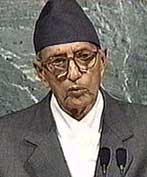 The wrangling within the Nepali Congress that flared up after the expulsion of Prime Minster Sher Bahadur Deuba from the party's general membership ultimately led to the official split of the party on 18 June.
The wrangling within the Nepali Congress that flared up after the expulsion of Prime Minster Sher Bahadur Deuba from the party's general membership ultimately led to the official split of the party on 18 June. The vertical split became official when the Deuba faction ousted Girija Prasad Koirala from the party leadership. However, since this group failed to get the support of 40 percent of the Central Working Committee or the parliamentary team (because parliament has been dissolved), it may not have the status of national party and would just be considered a splinter. This split automatically removes the Nepali Congress that won the 1999 general elections from power, while the splinter group remains in government.
The Nepali Congress party has said that the so-called general convention held by the Deuba faction, as well as its decision to withdraw Deuba's expulsion and remove Koirala from leadership are unconstitutional. Party spokesman Arjun Narasingh KC said that the Deuba faction could have approached the party through constitutional channels if they were serious about changing leadership. "The Nepali Congress party finds it unconstitutional, tyrannical and irrational," he said.
The splinter group made an application to the Election Commission on 19 June claiming that there was a change in the party leadership. "The Election Commission should recognise that the change of party leadership was the decision of a party convention," said Khum Bahadur Khadka, the political brain of the splinter group. The Nepali Congress had registered with the Election Commission on 7 June to contest the general elections scheduled for November, without Deuba's in its CWC. The contradictory claims made by the party and the splinter group are likely to spark fresh legal battles.
The splinter group has six (former) CWC members including Deuba, Khum Bahadur Khadka, Bijaya Kumar Gachchhedar, Chiranjibi Wagle, Prakash Man Sigh, Pradip Giri and Bimalendra Nidhi. The others have stayed back with the mainstream. The splinter thus has failed to get the minimum 40 percent of CWC members to its side, as is required by law for a party divide. And since the House of Representatives has already been dissolved, the provision which states that a new party can be created when an older one splits with at least 40 percent of the parliamentary committee members is not in force.
The moderate leaders who worked to keep the party united until the very end, eventually stayed with the mainstream. The Deuba faction lost more participants at the "general convention" when the moderate Ram Chandra Paudel-who the splinter was angling to instate in their CWC-said he was staying with the main party. .Poudel had issued an appeal to the Congress members to abide with the mainstream, and personally guaranteed their political protection even after they had attended the convention called by the Deuba faction. During the general convention, the Deuba faction told the participants that former MP Hari Thapa's request to register a no-confidence motion against party president Koirala had been turned down by the Nepali Congress' Central Office. Hom Nath Dahal later, a press meet reiterated the lie. He could not produce legal papers to prove his claims.
The Deuba faction had initially called an assembly of the NC general council members, which was later declared a general convention. The Nepali Congress party constitution requires a written request from at least one-fourth of the general convention members to convene a special general convention. The Deuba faction bypassed this requirement. Similarly, the Nepali Congress charter requires at least two-thirds of the general members to vote to oust a party president. The splinter group amended this provision to make it "at least two-thirds of the participants at the general convention" to oust Koirala. The faction has accused Koirala of being despotic, dictatorial and absolute. They also charge him with repeatedly bypassing party rules and practices and also harming the confidence of the Royal Nepal Army by criticising its role against Maoist terrorism.
Meanwhile, six general convention members have accused the Deuba faction of having misused the government's administrative powers and the police force to have them abducted from their districts and had been brought over to Kathmandu to participate in the so-called general convention.


